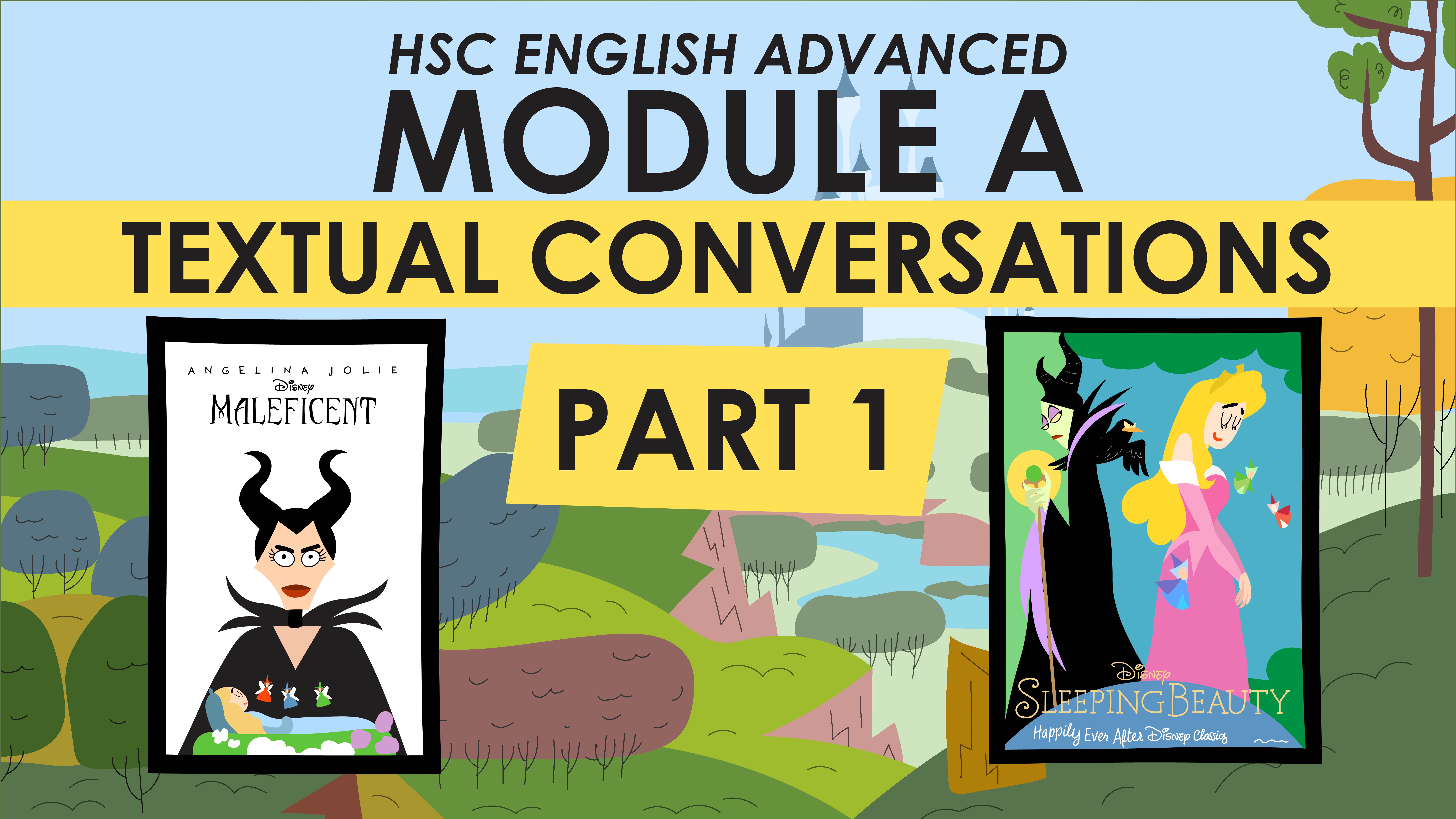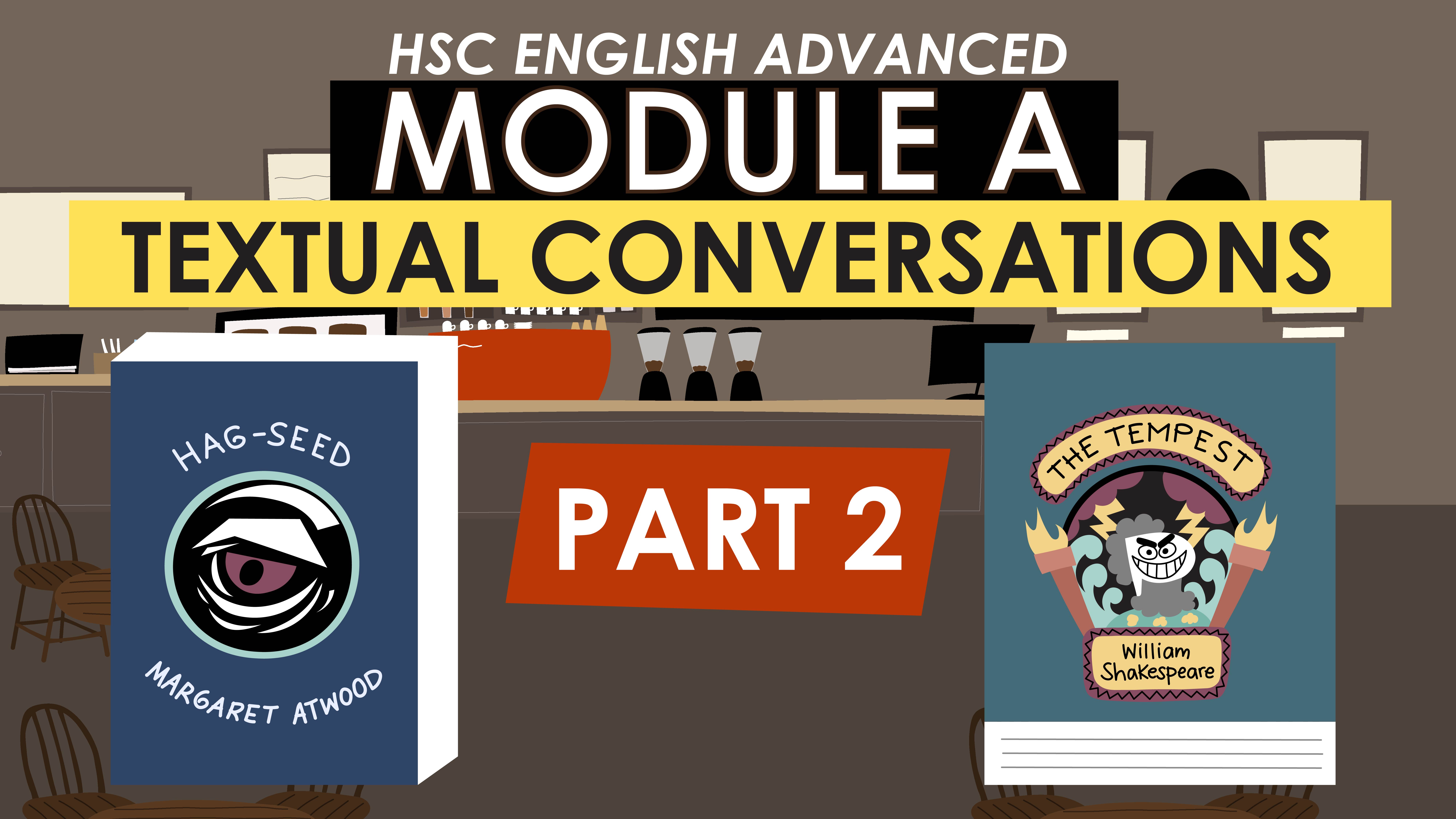HSC English Advanced Module A
HSC English Advanced Module A | English
 37:33
37:33
Advanced Module A: Textual Conversations
Guide for Parents and Students
If you’re studying HSC English Advanced – you’ve come to the right place! At Schooling Online, we understand that HSC English can be challenging, especially because it’s a compulsory subject.
Don’t worry, we’re here to help! Our animated videos will guide you through the Advanced Module A: Textual Conversations rubric with the help of engaging explanations and entertaining illustrations. We’ll develop your deep understanding of the rubric by covering its key ideas, complex vocabulary and prescribed texts.
Soon enough, you’ll improve your ability to answer to unseen questions and write extended responses that stand out from the crowd. It’s easy when our videos are always at your fingertips!
Breaking Down the Module A Rubric
First, check out our unique two-part series that breaks down the Advanced Module A rubric in detail. We demonstrate how to apply the rubric by comparing two classic texts that everyone can understand: Sleeping Beauty and Maleficent. These films aren’t prescribed for the HSC, we just use them as samples to show you how a comparative study, or ‘Textual Conversation’, works. This gives you the confidence to apply the rubric to any pair of texts set for study in Module A.
Our two-part series on the rubric covers:
1. The meaning of ‘Textual Conversations’
2. Resonances and Dissonances
3. Reimagining and Reframing
4. Issues, Values, Assumptions & Perspectives
5. Context and Values
6. How to Identify, Interpret, Analyse and Evaluate key aspects in texts
7. The purpose of texts
8. Expressing a personal response
9. How to find enjoyment in a comparative study
10. How our personal contexts influence our interpretation of texts
11. Motif, allusion and intertextuality
12. Composing responses in Module A
We break down the rubric, sentence by sentence, to make it easier to understand this challenging module. Since understanding the rubric is vital to your success in Module A, ourt two-part rubric series is your secret weapon!
Understanding Prescribed Texts
We also offer lessons that explore the prescribed texts for Advanced Module A. These videos focus on the syllabus content, which will help you develop sophisticated arguments in your responses. We’ll introduce you to the central themes and values in each text, while maintaining a focus on how the pairs of texts ‘mirror, align or collide’ with one another. You’ll love our clear explanations and helpful tips for assessments and exams!
How to get the most out of our videos:
1. Before you start studying the module at school
Start your HSC year strong! Why not watch our lessons during the holidays or a few weeks before covering the module in class?
We’ll take you step-by-step through the rubric, introducing you to the key ideas and terminology. We offer you practical insight into how a comparative study works. As you watch our videos for the first time, jot down notes or create a visual mind-map to refer to at school. You’ll find our definitions of key techniques like motif, allusion and intertextuality especially helpful!
2. While your class is studying the module
Watch our lessons one by one as your class covers the module. Use our lessons to enhance your understanding of the rubric before reading, analysing and comparing your two texts. This will help you stay on track and work through your texts more efficiently.
Once you start studying your prescribed texts, watch our videos to understand their contexts, plotlines, themes, values and key textual evidence. We clearly relate each prescribed text to key ideas in the Advanced Module A rubric.
We want you to study the module at your own pace, so feel free to replay challenging sections and skip parts that you already understand. By viewing and reviewing our lessons on a regular basis, you’ll improve your understanding of complex concepts. Draw on this knowledge as you analyse and compare your set texts and develop your own ideas.
As you watch each lesson, write down notes that could be valuable for your school work and future exam revision. Remember, you can always re-watch any of our videos to help you master Module A!
3. When preparing for an assessment
Watch our videos before assessments to refine your understanding of the module. You can revise the whole rubric to find fresh inspiration and make new connections between your texts. Otherwise, you can re-watch specific videos to fill in any gaps in your knowledge. Maybe you could revise with some classmates and discuss the major ideas in your texts. Soon enough, you will feel confident to tackle all your school assessments... and the big HSC exam itself!
Guide for Educators
Teaching the HSC English Advanced modules can be challenging, even frustrating, due to the paucity of up-to-date materials. At Schooling Online, we recognise the need for practical, research-based teaching resources that target each module in the HSC English Advanced course.
Our videos support what you do in the classroom by presenting vital syllabus content in brief, engaging episodes. We also offer a Teacher Resource Pack full of professionally designed, ready-to-use resources for teacher’s subscriptions through schools. All our resources are written by qualified and experienced Secondary English teachers. The Thinking Routines in each Resource Pack are customised to each video and will facilitate conceptual engagement with the rubrics and prescribed texts.
Our fun yet focussed approach also supports students who often feel overwhelmed as they commence the HSC English Advanced course. Schooling Online acknowledges the heightened wellbeing needs of Stage 6 students. Our videos are another tool you can use to support your students in their coursework and assessment preparation.
Our videos create opportunities for active learning in a classroom environment. We take the hard work out of learning by explaining concepts in a clear and structured way. This effective approach caters to a broad range of learners. Students that struggle with interpreting and analysing texts will gain confidence and new skills, while higher-level students can consolidate their understanding and excel.
We encourage you to integrate our videos and resources into your teaching plan. Our videos are based on the NESA Stage 6 Syllabus requirements for English Advanced, English Standard and English Studies. Sign up your school with Schooling Online today and take advantage of our full suite of lessons and customised teaching resources.
Breaking Down Module A
Over two lessons, we unpack every element of the Advanced Module A rubric. We know that students struggle to absorb this complex rubric the first (and even second) time around, so we’ve extracted the key points for them.
Over two lessons we’ll cover:
1. The meaning of ‘Textual Conversations’
2. Resonances and Dissonances
3. Reimagining and Reframing
4. Issues, Values, Assumptions & Perspectives
5. Context and Values
6. How to Identify, Interpret, Analyse and Evaluate key aspects in texts
7. The purpose of texts
8. Expressing a personal response
9. How to find enjoyment in a comparative study
10. How our personal contexts influence our interpretation of texts
11. Motif, allusion and intertextuality
12. Composing responses in Module A
The comparative study of two texts is often a daunting experience for students. To help counteract this, we have applied the rubric to two much-loved Disney films, Sleeping Beauty and Maleficent. This offers a clear demonstration of how to execute the style of analysis required in Module A. By using these accessible examples, students will gain a stronger working knowledge of the requirements of the rubric. This practical approach paves the way for students to apply the rubric to their set pair of texts.
Understanding Prescribed Texts
We also offer lessons that explore the prescribed texts for the module. These videos draw on the syllabus content, which will prepare your students to develop sophisticated arguments in their essays. These valuable lessons cover the context, plotlines, themes, values and key textual evidence in each prescribed text.
How to get the most out of our videos:
1. Introducing students to the module
Students may be daunted when they first read the rubric and realise they need to apply it to two substantial texts. Why not give your students an overview of the rubric and key ideas by showing our videos in class?
The videos explain each element of the rubric in detail and demonstrate its application through practical examples.
We don’t assume that students remember all the metalanguage in English. That’s a lot to remember! We define all the techniques and important terms we use in our lessons, so students don’t feel lost or too embarrassed to ask, ‘what does that mean?’ We clarify metalanguage as we go so your students can focus their energy on more challenging concepts.
Our videos also give you full flexibility. You can introduce students to the module by watching our breakdown of the rubric in class. This will pique students’ interest and establish the overarching goals for the module. Students can also watch the videos for homework to consolidate their understanding. It’s so easy when our videos are a click away!
2. Supporting students as they study a text
At Schooling Online, we want your students to become confident, independent learners and thinkers. That’s why our videos model and teach analytical skills in addition to explaining concepts. We recognise the need for students to develop their unique insights into a text, so we’re offering useful resources that support students in studying their prescribed texts.
Every video is appropriate for watching in class or as an extra resource for students to use at home.
Turn your classroom into an interactive environment by incorporating our customised teaching resources. They will rise to the challenge of higher-order thinking, collaboration, creativity and self-reflection.
Alternatively, the class could watch each video in short segments. Pause the video at the beginning or end of each key section and open a small group discussion.
For example, after watching our definition of ‘Textual Conversations’ in Lesson 1 of the Advanced Module A rubric series, ask students to brainstorm in small groups. Each small group identify a pair of popular and familiar texts (e.g. a film and a song, two songs, two films, a poem and a novel, a short story and a play) that contribute to the same topic or ‘conversation’ about an aspect of life.
3. Use our videos for internal and external assessment preparation
Do your students stress out when you remind them of an upcoming assessment? Make the task more enjoyable by using our videos! Play our videos when revising over content in class. You may also assign videos for students to review at home in preparation for an assessment, especially in the lead-up to trial or HSC exams.
The detailed analysis in our videos can be used as building blocks for paragraphs in critical responses. The style of narration in our videos, which includes puns, quips, rhetorical questions and colloquial language, is also a good example of discursive writing! In addition to studying the content of our videos, your students could also analyse how we make our videos more engaging through discursive devices. Our videos also encourage self-reflection. You could set short, reflective writing tasks after viewing our videos. Students will find it useful to practise reflective writing and chronicle their personal journey towards deeper understanding of the rubric and prescribed texts. They may also wish to reflect on how their ideas and language use have developed by studying English Advanced Module A.
As trial or HSC exams approach, feel free to use our videos as resources for the following sample activities:
• Discuss the videos that break down the rubric to prepare students for questions in Paper 2
• Discuss the videos on the prescribed texts to revise context, themes and values, and key textual evidence
• Compose critical, discursive and creative responses that build on ideas presented in any of our videos
Are you studying English Advanced for the HSC? Our HSC English Advanced Module A Series is designed for you! These vibrant videos bring HSC English to life using detailed analysis and engaging explanations. Our lessons address the NESA Stage 6 English Advanced Syllabus, as well as the Year 12 Australian Curriculum.
Over two videos, we unpack each element of the Advanced Module A: Textual Conversations rubric.
We explore a range of prescribed texts for the module, including Shakespearean drama, film, prose fiction, poetry and drama. We also delve into the connections and clashes between each pair of texts that you might study.




